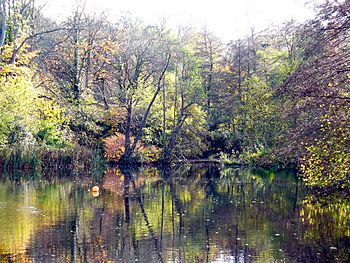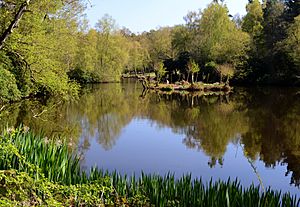River Ock, Surrey facts for kids
Quick facts for kids Ock |
|
|---|---|

Millpond on the Ock near Great Enton
|
|
| Country | England |
| County | Surrey |
| District | Waverley |
| Physical characteristics | |
| Main source | various in Waverley (borough), Surrey |
| River mouth | River Wey Godalming |
| Length | 7.5 km (4.7 mi) |
| Basin features | |
| River system | Wey catchment |
| Basin size | 26.4 km2 (10.2 sq mi) |
| Tributaries |
|
The River Ock is a small river in Surrey, England. It flows into the River Wey, which means it's a 'tributary' – like a smaller stream joining a bigger one. The River Ock is about 7.5 kilometers (4.7 miles) long. It helps drain an area of about 26.4 square kilometers (10.2 square miles) in the Waverley area.
Where the River Ock Flows
The River Ock actually starts from several small streams. These streams begin in the western part of Hambledon and the eastern part of Witley. These smaller streams join together north of areas like Wheelerstreet, Enton Green, and Tuesley.
One important stream that joins the Ock comes from Busbridge Lakes. These lakes used to be fish ponds. The Ock then flows through a part of Godalming called Ockford. Finally, it reaches the center of Godalming town and flows into the River Wey.
Interestingly, the Portsmouth Main Line railway track follows the river for much of its journey.
Historic Watermills on the Ock
For hundreds of years, people used the power of rivers to run machines. These machines were often in buildings called watermills. The River Ock was strong enough to power several of these mills.
- The Old Mill in Godalming: This mill was first known as Hatch Mill. It used the river's flow to power its machinery.
- Rake Mill at Witley: This mill was a 'fulling mill'. Fulling was a process used to clean and thicken wool fabric. Later, a famous artist named Neville Lytton used it as his art studio. Sadly, a fire in 1902 destroyed the building and most of his artwork.
- Other Mills: There was also a tannery in Godalming, which processed animal hides into leather. A corn mill at Enton ground corn, and a flour mill at Ockford made flour.
River Ock's Water Quality
The Environment Agency checks the health of rivers in England. They give each river an 'ecological status' and a 'chemical status'.
- Ecological Status: This looks at the living things in the river. Scientists check the types and numbers of tiny creatures called invertebrates, water plants (like angiosperms), and fish. This helps them understand if the river's ecosystem is healthy.
- Chemical Status: This checks for harmful chemicals in the water. They compare the amount of chemicals found to safe levels.
Rivers can be rated as high, good, moderate, poor, or bad for ecological status. For chemical status, they are either 'good' or 'fail'.
In 2019, the water quality of the River Ock was rated as follows:
| Section | Ecological Status |
Chemical Status |
Overall Status |
Length | Catchment | Channel |
|---|---|---|---|---|---|---|
| River Ock | Bad | Fail | Bad | 7.51 km (4.67 mi) | 26.394 km2 (10.191 sq mi) |
The table shows that in 2019, the River Ock's water quality was unfortunately rated as 'bad' for its overall ecological health. Its chemical status was also a 'fail'. This means there are problems with both the living things in the river and the chemicals present in its water.
 | Jessica Watkins |
 | Robert Henry Lawrence Jr. |
 | Mae Jemison |
 | Sian Proctor |
 | Guion Bluford |


